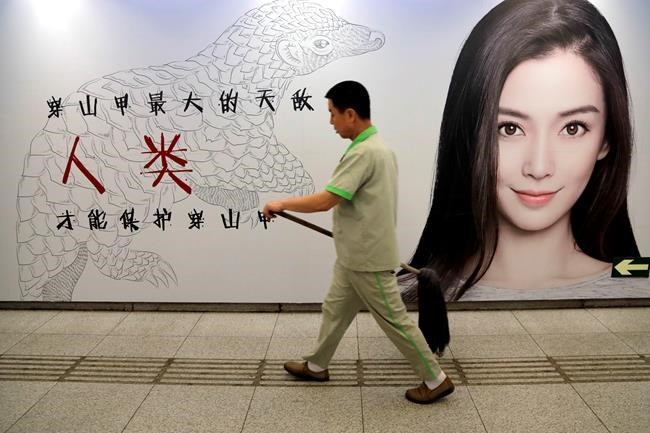
In this Thursday, Aug. 25, 2016 photo, a maintenance worker walks past an anti-pangolin trafficking billboard featuring Chinese actress Angelababy in an underground walkway in Beijing. Although a global wildlife summit banned all trade of pangolins, an anteater with a distinctive coat of hard scales, doubts remain whether that will stop the illegal traffic of pangolins in Africa fueled by a growing demand from Asian consumers, particularly Chinese. (AP Photo/Andy Wong)
October 05, 2016 - 7:54 AM
KAMPALA, Uganda - Commercial trade in the pangolin, a scaly anteater with a distinctive coat of hard shells, is now forbidden following decisions made last week at a conservation meeting in Johannesburg.
The pangolin is the world's most heavily trafficked mammal, with rampant poaching driven by demand for its meat, considered a delicacy in Vietnam and some parts of China, and its scales, which are used in traditional Chinese medicine.
The Associated Press spoke to a former pangolin poacher, a park ranger trying to curb poaching, and an undercover investigator about the trade.
___
THE FORMER POACHER
Michael Ojara, a 20-year-old farmer, said police arrested him in April after he caught a pangolin near his village in northwestern Uganda and tried to sell it. Ojara, whose village of Lagaji is near Murchison Falls National Park, said he was sentenced to three months' imprisonment.
"I don't want to engage in poaching anymore, because I feel that if I do again, I will get arrested," Ojara said in an interview late last month. Ojara said he had also killed an elephant a few years ago that wandered into his village from Murchison Falls because it was ruining his crops.
___
THE RANGER
Denis Odong, 30, is a Ugandan ranger who said he has only spotted a pangolin once in his eight years on the job. Odong, who works at the Kidepo Valley National Park, bordering South Sudan, said local villagers need to be provided with incentives to preserve wildlife.
But buyers of pangolin scales, which are widely used in traditional Chinese medicine, play a greater role, he added. "Even the Chinese themselves, they know that poaching the pangolins will endanger the species," Odong said.
___
THE UNDERCOVER INVESTIGATOR
Rebecca T. works as an undercover investigator into the trade of pangolins for the Natural Resource Conservation Network, a Ugandan non-profit group. The 27-year-old agreed to an interview on condition of partial anonymity because revealing her identity could undermine her investigations.
Posing as a potential buyer, Rebecca connects with traffickers and travels across Uganda to meet them, see the products — usually live pangolins or scales — and negotiate prices. Once a deal and meeting has been set up, the group works with police to mount an operation and arrest the traffickers.
"They have big people behind them, they are not alone," the investigator says of the traffickers. "They use expensive dogs, sometimes guns, and if you trace these guns you find that they come from the authorities."
___
The International Women's Media Foundation supported Franchineau in her reporting in Uganda as part of its Africa Great Lakes Initiative.
News from © The Associated Press, 2016